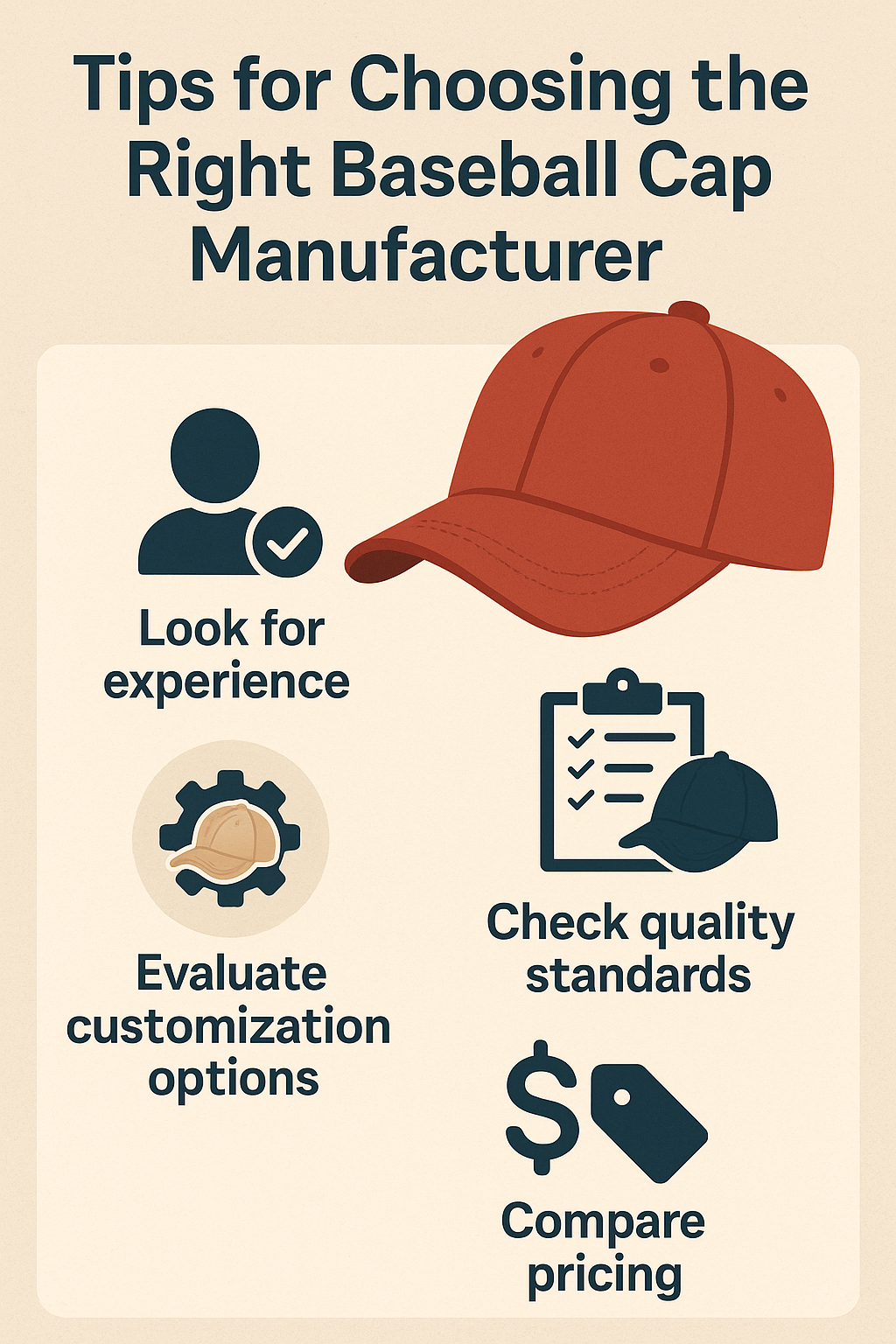In this article, we’ll walk through expert tips to help you select the best manufacturer for your needs — especially if you’re working with overseas factories, like many businesses sourcing from China. We’ll also look into how to identify reliable partners and what pitfalls to avoid.
1. Understand Your Cap Requirements First
Before reaching out to any manufacturers, define what you’re looking for. This will make it easier to communicate your needs and quickly eliminate suppliers who aren’t a good fit.
Ask yourself:
What styles of caps do I want? (e.g., snapbacks, fitted, trucker, or dad caps)
What materials do I prefer? (cotton, polyester, wool blends, etc.)
How many colors, sizes, or customizations will I offer?
Do I need logos, patches, embroidery, or printing?
Once you’ve narrowed this down, you can approach manufacturers with clarity — and they’ll be more likely to take you seriously.
2. Look for Cap-Specific Expertise
There are many general apparel manufacturers out there, but when it comes to headwear, expertise matters. Working with a baseball cap manufacturer that specializes in hats ensures better product quality, design consistency, and the ability to provide technical advice on fit, materials, and construction.
For example, Jointophat focuses entirely on headwear, with experience in baseball caps, bucket hats, boonies, and more. Manufacturers like these understand the nuances of brim shape, crown structure, adjustable closures, and branding options.
3. Check for Customization Options
One of the biggest advantages of working with an experienced manufacturer is the ability to customize your baseball caps to fit your brand identity. Look for these services:
Custom logos: Embroidery, 3D puff, or screen printing
Labeling: Inside labels, hang tags, woven patches
Materials and colors: Pantone-matched fabrics, unique textures
Closures: Velcro, snapback, buckle strap, etc.
Ask the manufacturer for a full list of customization capabilities. Also, request samples of previous work to assess their quality.
4. Consider Low Minimum Order Quantities (MOQs)
Startups and small businesses often can’t afford to order thousands of units. That’s why it’s important to find a manufacturer with low MOQs — without sacrificing quality or flexibility.
Some specialized suppliers like Jointophat are open to smaller batch orders while still maintaining professional quality standards. This allows brands to test the market before scaling up.
5. Evaluate Communication and Responsiveness
Clear and timely communication is key when working with overseas manufacturers. You should be able to easily contact them, ask questions, and receive prompt replies. A good manufacturer will:
Respond within 24–48 hours
Speak clear English
Provide detailed answers and quotations
Understand and follow your design specs
When manufacturers are slow to respond or vague in communication, it may be a sign of deeper issues such as disorganization or poor customer service.
6. Ask for Samples Before Mass Production
Never skip the sample stage — even if it costs extra or adds time. The sample gives you a tangible preview of how your final product will look and feel. It also allows you to make adjustments before investing in bulk production.
Be sure to inspect the sample for:
Stitching quality
Logo accuracy and placement
Color matching
Fabric texture and durability
Overall structure and sizing
If the sample doesn’t meet your expectations, communicate changes clearly and request a revised version.
7. Check Factory Certifications and Ethical Practices
Consumers today care about ethical sourcing. Brands that ignore this can suffer damage to their reputation. Ask your manufacturer about:
Factory audits or certifications (ISO, BSCI, Sedex, etc.)
Labor practices (Are workers paid fairly? Safe conditions?)
Environmental policies (Do they minimize waste or use eco-friendly fabrics?)
Manufacturers who take compliance seriously will be transparent and provide documentation
8. Read Client Reviews and Case Studies
Don’t just rely on what the manufacturer says — look for testimonials, case studies, or online reviews from other businesses. Social proof can tell you a lot about reliability, service quality, and final product satisfaction.
Some helpful places to look:
Alibaba reviews (for manufacturers listed there)
Industry forums
Google reviews or Trustpilot
Client portfolio or brand collaborations shown on their site
9. Compare Pricing, But Don’t Choose Based on Price Alone
Everyone wants a good deal, but cheapest isn’t always best. A slightly higher price may come with better customer service, faster delivery, or superior materials.
When comparing quotes, ask for:
Unit price breakdowns
Shipping costs (especially international)
Cost of customization
Sample charges
Payment terms (deposit, full payment, etc.)
This full picture helps you understand the value you’re getting — not just the upfront cost
10. Build a Long-Term Relationship
If you find a trustworthy baseball cap manufacturer, nurture that relationship. Consistency is key when building a brand, and switching manufacturers frequently can lead to product variability and delays.
A long-term supplier will:
Understand your design preferences
Offer you better pricing and priority over time
Be more flexible during rush orders or product launches
Companies like Jointophat that focus on headwear specifically tend to develop strong client relationships over the long term due to shared goals and niche understanding.
Final Thoughts
Choosing the right baseball cap manufacturer is a foundational step for launching or growing your apparel brand. It affects your product quality, delivery timeline, brand identity, and ultimately your customers’ satisfaction.
Make sure to research, request samples, assess communication, and prioritize headwear-specific expertise. Whether you’re launching a seasonal collection or building a new streetwear label, the right manufacturing partner can help bring your vision to life.
If you’re looking for a manufacturer who specializes in high-quality caps with full customization, Jointphat offers a range of solutions backed by years of industry experience.


